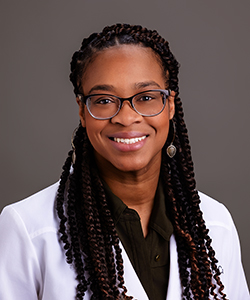November 19, 2025

Once upon a time, pregnancy after age 35 was labeled as "geriatric pregnancy." But in recent years, the term has become outdated — and the reality has changed, too. More people are choosing to start or grow their families later in life, at is what’s now called an advanced maternal age, and it’s becoming increasingly common. In fact, 2023 marked the first time more babies in the U.S. were born to moms older than 40 than to teenagers.
Some attribute the rise in later pregnancies to women prioritizing careers and financial independence before starting a family. You can also make a case for the increasing advancements in fertility treatments.
The truth is, there are a million reasons someone might become or plan to become pregnant at an advanced age. The important thing is knowing what to expect and what you can do to increase the likelihood of a healthy and successful conception, pregnancy and birth.
To gain some insight, we spoke with Tia Brodeur, MD, an MU Health Care OBGYN and fertility specialist. She shares everything you need to know, from planning through pregnancy, for women hoping to have a child after age 40.
Planning for Pregnancy Later in Life
Everywhere you look, celebrities are having babies later in life — some even into their 50s. How hard can it be? Well — besides the fact that many of those babies may be the product of donor eggs — conceiving and carrying a child after age 40 can be more challenging than you think.
"Even if you look fantastic and don't have a wrinkle on your face, it doesn't change what happens in our eggs on a microscopic level as we age," Dr. Brodeur says. "Planning for those changes is critical."
Whether you are putting off pregnancy intentionally or just want the option of having children later, Dr. Brodeur recommends essential planning steps, including:
- Optimize your lifestyle: As we age, it's common to gain weight or develop medical conditions such as diabetes and high blood pressure. Taking steps early to prevent and manage those issues can help with conception and pregnancy later.
- Track your cycle: Your menstrual cycle is a vital sign of fertility. Tracking helps you spot changes quickly. Bring any concerns to your doctor, especially if you are thinking about becoming pregnant.
- Partner with your doctor: Your primary care physician or women's health provider can identify potential health issues that may impact your ability to get pregnant. Start the conversation in your early 30s if you are considering freezing your eggs.
- Consider freezing your eggs: Freezing eggs provides the best insurance against the future. Studies identify the early 30s as the optimal time to freeze eggs when considering cost and success rate.
- Plan for the cost: Fertility treatments, if you need them, can be costly. Begin saving early and see if your employer offers coverage for treatments and egg freezing to reduce the burden.
Navigating Conception in Your 40s

Fertility naturally decreases with age. Between 45% and 50% of women in their mid-20s with no fertility issues can expect to have a baby. By the early 40s, the number of births decreases by half — dropping to under 20%.
"It's critical to consider proper timing, monitor your cycles and track ovulation to increase your chance of successful conception," Dr. Brodeur says. "Changes to your menstrual flow or duration, cycle irregularity and weight gain can all be signs of diminished fertility."
Conditions like polycystic ovary syndrome (PCOS), fibroids and endometriosis are more likely to occur with age and can impact fertility. Dr. Brodeur recommends basic fertility testing — which can identify those types of issues — for anyone over age 35.
Understanding the Fertility Testing Process
A fertility evaluation can be helpful for anyone with concerns about conceiving, especially after age 35. If you are between ages 35 and 40 and have no known health concerns, Dr. Brodeur suggests trying for six months on your own before consulting a specialist. Dr. Brodeur and the American Society for Reproductive Medicine recommend people over 40 seek fertility testing right away.
"Testing doesn't mean you have to jump into fertility treatment," Dr. Brodeur says. "It's done to identify problems early, because after age 40, waiting an extra six months or more can start to affect pregnancy rates."
Fertility testing typically involves:
- Semen analysis (if you have a male partner) to check sperm count and motility
- Ultrasound to check for fibroids or other structural issues
- Analysis of your health to diagnose and treat potentially undiagnosed gynecologic conditions
- Evaluation of your ovarian reserve, conducted using a blood test, cycle-dependent testing or transvaginal ultrasound, to better understand how many eggs you have
Managing Fertility Treatment
Fertility treatment such as in vitro fertilization (IVF) can seem daunting, but understanding the process and options — including needle-free IVF — can help. The general steps of IVF include:
- Stimulating the ovaries to produce more eggs using injected or oral medication
- Blocking ovulation using injected or oral medication to help keep your eggs safely in your ovaries
- Retrieving eggs, which involves a surgical procedure conducted under anesthesia
- Transferring embryos into your uterus
"If you have a fear of needles or are worried about the process, discuss the options (including oral medication) with your doctor," Dr. Brodeur says. "I also recommend IVF with embryo screening for chromosomes to reduce risk of miscarriage and genetic conditions."
What to Expect With Pregnancy at an Advanced Maternal Age
Pregnancy after age 40 involves a lot of close monitoring. Your doctor will be watching for several things, including:
- Obstetric concerns: After age 40, there is a higher risk of gestational diabetes and preeclampsia — high blood pressure that develops during pregnancy. The risk of spontaneous twins also increases with age.
- Risks to the fetus: Pregnancy at an advanced maternal age increases the risk that the baby may be born with a genetic condition, such as Down syndrome. Genetic testing during pregnancy can help with preparation for potential issues and reduce stress for new parents.
Dr. Brodeur also suggests creating a birth plan that accounts for the age-related increased risk of needing a cesarean section (C-section).
"Even though you may want a vaginal delivery, advanced age reduces the chance of that happening," Dr. Brodeur says. "Consider how you might include the possibility of a C-section into your birth plan, so that you are prepared."
Remember, Dr. Brodeur adds, while the pregnancy journey after age 40 may look different from pregnancy at a younger age, the goal is the same — a happy and healthy mom and baby.
Next Steps and Useful Resources
- Want to discuss more? Speak with a fertility specialist.
- Not sure what your options are? Learn more about our fertility services.


